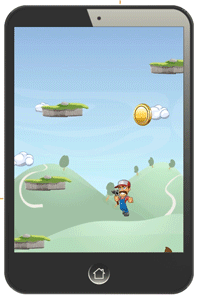Cognitive skills (aka our brain cogs) work together to help us process, remember, and apply incoming information every day. And just like in a machine, if a single cognitive skill is weak, it can cause major learning struggles.
As grownups it's our responsibility to find activities that help our kids develop and strengthen those skills. Good news: Kids can do so by coding their own games using tools like Bitsbox!
Here are 4 cognitive skills, in particular, that benefit from kids coding their own games:
1. Sustained Attention: Coding encourages kids to stick with difficult tasks
Staying focused for extended periods of time is called sustained attention. Because of the quick and rewarding feedback loop that short apps offer, kids are incentivized to keep coding because of their inherent curiosity. If my app is this fun after a few lines of code, how fun will it be after 100 lines of code?! Kids are highly motivated by the end result: a fun game!
Take these two Bitsbox apps, for example:


The hamster app on the left was built from 2 fairly simple lines of code. However, Super Plumber Jumper took 78 lines of code to build!
It's not easy to write nearly 80 lines of code, and it requires sustained attention to do so. But, clearly, the hard work to code SPJ is worth it. This crazyfun app not only has a fun environment, but controlled movement, obstacles, an objective, and a bad guy!
We introduce projects like the hamster app early on in our learning system to reward small milestones throughout the app-building process. As coders work through the app projects, they're guided to add complexity to their games. Kids quickly realize that if they commit to learning more coding concepts, they can build more complex and fun apps like Super Plumber Jumper!
2. Visual Processing: Coding requires you to process incoming information quickly
Visual processing is a cognitive skill that our brain uses to make sense of the world around us. This skill is especially important in math and reading because these subjects require fast eye movement and eye teaming. If this skill is weak, a child will learn at a slower pace.
When you code, you're essentially following a recipe of written code in order to build an app on the screen. To build a successful app, you have to recall coding concepts you've used in the past, understand their relationship to the code you're working on currently, order the concepts appropriately, and visualize what you want the app to look like at the end!
Kids practice both math and reading when they code with Bitsbox, as well as technology, science, and design! Check out 3 fun and free STEM projects for kids!
3. Working Memory: Coding is a learn-as-you-go process
Coding is a process of constant troubleshooting. If you're stuck on a piece of code, you try new things over and over again until it works.
Working memory is a cognitive skill that allows you to remember information as you are in the process of using it. The debugging process in coding constantly practices this skill!
For example, you may figure out that an untouch function doesn't work in your code, but a tap function does. It's essential to remember what worked and what didn't, apply it to the app you're currently coding, and use that lesson down the road when you're building a similar app!
4. Problem solving: Coding teaches you to identify and fix problems
Problem solving is the skill that enables you to define problems, form solutions, and pick the best course of action. If this cognitive skill is weak, kids find themselves stuck, thinking What do I do next?
Getting bugs in your code is inevitable. Luckily, the process of finding and fixing bugs teaches kids to be creative in their problem solving!
Bitsbox projects include fun challenges at the bottom of the app cards so kids can practice tweaking code. For example, in It's Raining Cats and Dogs, we ask Can you make the animals bigger? And then Can you make it rain hamsters too?
Challenges like these prompt kids to continually engage with the code, so they won't be left unsure of what to do next. Soon enough, they're off and running with the code—creating their own challenges!
Check out Coding is hard. That's why your kids should learn to learn about how problem solving with code helps kids develop a mindset for success!


